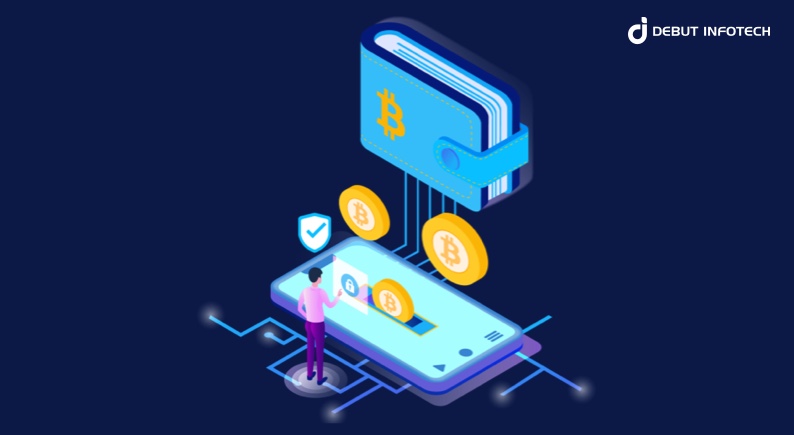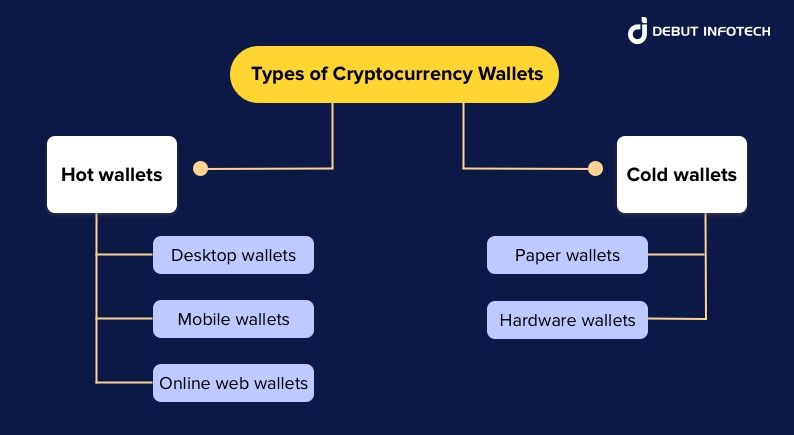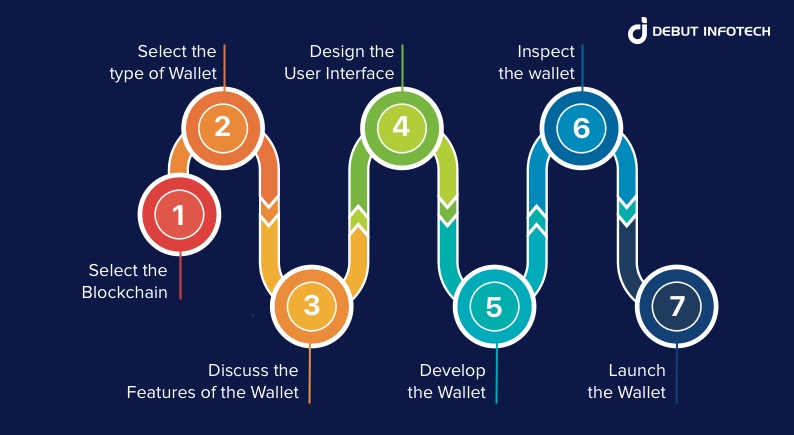Table of Contents
Home / Blog / Blockchain
The Ultimate Guide To Blockchain Wallet Development
May 13, 2024

May 13, 2024
Blockchain technology has transformed how we store and transmit money online. Although blockchain technology was initially applied to Bitcoin, it has subsequently developed to be used for a wide range of other uses. Blockchain-based wallets, which let users safely store and manage their cryptocurrency holdings, are one example of such an application. The creation of blockchain wallets has become profitable, with numerous businesses competing to provide their customers with the greatest wallet experience.
Choosing the best blockchain development company that aligns with your desired wallet type is essential. Understanding the nitty-gritty of a blockchain wallet can also help you make the right choice when thinking of who to store your crypto. More so, knowing the different types of crypto wallets that exist will help you make the right choice.
In this blog post, we will discuss blockchain development, what developers should look out for, and the benefits of a blockchain wallet for users.
What is a Blockchain wallet?

A blockchain wallet is a software that is used in storing and transferring crypto and other cryptocurrencies using private keys. Speaking of that, you can access two keys when you register for your blockchain wallet.
- Private key: This can only be used by you to transfer crypto from your wallet to another person. No one should know this key because it could lead to hacking or losing your coin.
- Public key: As the name implies, anyone can have it. It is your wallet address that you share with others when they want to transfer coins to your wallet.
To understand this, the private key is like your pin or security details to your bank account for money withdrawal only. The public key is like your bank account number, which you share with others to transfer money.
Hence, when users send cryptocurrency to another wallet, they sign the transaction with their private key, which is broadcast to the network. The nodes then verify the transaction and add it to the network. Once the transaction is validated or confirmed, the receiver’s wallet is credited with cryptocurrency.
But not all blockchain wallets are this straightforward. Hence, their interface can be difficult to navigate, leaving users gasping for breath every time they initiate a translation. So, let’s get into how a blockchain wallet works.
How Do Blockchain Wallets Work?
Users can transfer and receive cryptocurrency by connecting with the blockchain through blockchain wallets. When you create a crypto wallet, a private key is generated, enabling users to initiate transactions, while a public key enables users to receive cryptocurrency or any digital asset.
When users complete a transaction by sending it to another user’s wallet, such transaction is signed with the private key that is then broadcasted on the network. Nodes on the network verify the transaction and add it to the blockchain. Once the transaction is validated, the crypto is credited to the recipient’s wallet.
Mechanism that makes crypto wallet work
These are the components that allow blockchain wallet work.
Blockchain Network
The blockchain network is a decentralized network of nodes that each store a copy of the blockchain. A transaction is broadcast to the blockchain network by the user, and after being confirmed as valid, it is added to the blockchain by the network’s nodes.
Public and Private Keys
When creating a crypto wallet, you’ll generate a public address and private key. If you want to receive cryptocurrency, the public key is your ticket, but the private key is used to initiate transactions. The private key is meant for the wallet owner only; do not share it with others. However, the public address can be shared for you to receive cryptocurrency.
Transaction Verification
For a user’s transaction to be processed, the authenticity, amount of cryptocurrency, and recipient address must be verified. Also, to validate a transaction before confirmation, the nodes check whether it abides by the blockchain protocol.
Transaction Confirmation
Once a transaction is verified, it can not be reversed. Hence, once a transaction is added to the blockchain, the receiver wallet is credited with cryptocurrency.
Compatibility
With the development of multiple cryptocurrencies, the blockchain wallet must be compatible. The wallet should be able to support different crypto assets, as well as the most popular cryptos, such as Bitcoin, Ethereum, Ripple, and others.
Why You Should Consider A Cryptocurrency Wallet?
As a crypto enthusiast, keeping your crypto asset organized and secure is essential. However, several reasons can lead to the development of blockchain wallets. Here are some candid reasons you should create a blockchain wallet with an enterprise blockchain app development company.
Secure Storage
This is one of the best benefits of a blockchain wallet because it secures and organizes your cryptocurrency. With most crypto wallets being highly secured, the only way to manage or access your funds is through private keys. The private key serves as an authority and acts as a two-factor authentication in the wallet because the key is encrypted, and only the owner can access the wallet.
Fast transaction
Blockchain wallets enable the quick transfer of cryptocurrency without intermediaries like banks. It also doesn’t take long for transactions to be added to the blockchain after verification. Therefore, for a secure and quick transaction, users only need to enter the recipient’s public address and the amount to be sent. When it comes to transaction fees, blockchain wallet charges are pretty low compared to traditional banks.
Innovation
As the blockchain ecosystem continues to expand and evolve, creating an innovative blockchain wallet is a way to contribute to developing blockchain technologies. The continuous growth in the blockchain industry will require innovative solutions for the blockchain wallet.
Decentralization
Blockchain wallet supports the decentralization nature of blockchain technology. In essence, Users can use a blockchain wallet to participate in the blockchain network without depending on centralized intermediaries. This gives users greater control over their cash and transactions.
Investment
Blockchain wallets provide a safe haven to manage and store crypto investments. Many people create blockchain wallets to invest in cryptocurrencies as a means of investment diversification due to their growing dominance.
Different Types of Cryptocurrency Wallets

There are two main types of crypto wallets, all serving their needs in the crypto world. Most blockchain wallets fall into both categories. Both of them have their own features and you will have to choose according to your needs.
Hot wallets
Hot wallets are regarded as user-friendly and are used with the internet. The biggest issue with it is security. The Internet connectivity makes it more vulnerable to hacking risks. For this reason, experts advise against storing a sizable sum of money in a hot wallet.
Nonetheless, hot wallets are ideal for you if you transact cryptocurrency regularly. These wallets’ ease of use will speed up the transaction processing. The types of hot wallets include:
1. Desktop wallets: These wallets are software installed on your desktop. They are the most secure of all wallets and a great source for storing your wallet. Desktop wallets work without an internet connection, but to avoid the risk of hacking, download antivirus on your PC. They are the third most secure crypto wallet with top-notch privacy and a user-friendly interface.
2. Mobile wallets: These are typically mobile-based applications that are easy to use and suitable for investors who tend to do heavy day-to-day transactions. They are known for their portability and QR codes that make transactions faster.
3. Online web wallets: As the name implies, these wallets help users manage their crypto by internet browsers. Before using it, you must sign up on the website; hence, your private key is saved on the cloud, and they are prone to DDOS attacks. This easy-to-use wallet, although perfect for small investments, allows prompt transactions. Web wallets can be hosted or non-hosted, but non-hosted is preferred because they give you control over your crypto.
Cold wallets
One of the most secure ways to keep cryptocurrency is with cold wallets. The fact that these wallets are not internet-connected is among their best features. Only when you are transacting do you link them to the internet.
A lot of cryptocurrency speculators choose to use cold wallets. Not only are they user-friendly, but they are also safe. The best feature of them is that customer service is included. Some examples include:
1. Paper wallets: A physical crypto wallet that enables users to download their public key and save the private key on paper. Before the hardware wallet came into existence, users could store the crypto sent from another wallet on paper. Paper wallets were the most preferred and secure for investors. Paper wallets are also called non-custodian cold storage because users are in charge of their private keys, which are printed in a QR code and can be safely tucked away.
2. Hardware wallets: Your private keys are securely stored in a hardware wallet by using hardware devices. It is regarded as one of the safest wallets to store your keys in, out of hackers’ reach. It will usually set you back between $70-150. You get maximum security for your keys. Therefore, even though it seems a little pricey, it is worth it. It looks like a USB with side buttons and an OLED screen from the outside. It offers a far better UI compared with paper wallets. However, a hardware wallet may not be the best option for a novice. It might not be visually appealing.
Related Read: An Ultimate Guide to the Best Crypto Wallets
How to Build a Blockchain Wallet?

Building a blockchain wallet requires a thorough understanding of software development, cryptography, and blockchain technology. You can choose a top blockchain development company to assist you in creating a mobile wallet. In this part, we will go over each step of creating a blockchain wallet, from choosing the blockchain to launching the wallet.
- Select the Blockchain
Selecting the blockchain with which the wallet will communicate is the first stage in creating a blockchain wallet. The protocols, consensus techniques, and programming languages used by various blockchains can impact the layout and features of the wallet. The blockchains of Bitcoin, Ethereum, and Litecoin are a few that are often used for wallet creation.
- Select the type of Wallet
Blockchain wallets come in two varieties: hot wallets and cold wallets. While cold wallets are offline and used for storing cryptocurrency for a longer period of time, hot wallets are online and utilized for frequent transactions. The type of wallet will alter depending on the use case, and the development process will also change correspondingly.
- Discuss the Features of the Wallet
The next step is defining the wallet’s features after choosing the blockchain and wallet type. This covers various features, including interoperability with other cryptocurrencies, security features, and user interface. The following are a few functions that a blockchain wallet might have:
- Multi-currency support
- two-factor verification
- Transactions with multiple signatures
- Address book
- Prices Charts
- Scan QR codes
- Push Notifications
- Transactions History
- Design the User Interface
A blockchain wallet’s user interface (UI) is a crucial component. The user interface should be clear, easy to use, and intuitive. It should be simple for the user to send and receive transactions, monitor their balance, and access the wallet’s settings. Additionally, the user interface (UI) must be adaptable to various screen sizes and devices.
- Develop the Wallet
Next, wallet software needs to be developed. Several computer languages, including Java, Python, and JavaScript, can be used to create the wallet software. The software ought to communicate with the blockchain API to send and receive transactions, confirm transaction histories, and update balances. Security features like multi-sig transactions, 2-factor authentication, and safe private key storage should also be included in the wallet software.
- Inspect the Wallet
Before launching the wallet, it should be thoroughly tested to guarantee that it performs as planned and is secure. It is important to test the wallet’s security, functionality, and usability. To find and address any vulnerabilities, the testing process should involve penetration testing, automated testing, and manual testing.
- Launch the Wallet
When it has been inspected and validated, the wallet can be made available to the general public. It is recommended that it be included in well-known app shops like Google Play and Apple App Store. A marketing effort should be launched with the wallet to draw users and spark interest. Support staff should be available to address user questions and concerns.
Tips for the Security of Cryptocurrency Wallets
Regularly back up wallet: The sad reality is that software and online wallets are vulnerable to malware and hackers who may destroy or pilfer your valuable private keys. The only method to avoid this is to keep modest amounts of cryptocurrency assets in online wallets and the remainder in cold storage. Taking wallet backups may be done with software like Ledger Nano, which should become second nature.
Increase the security of your wallet: By using a complicated long-form password to secure it, you may make your digital money wallet as secure as Fort Knox. Choose trustworthy companies to generate your wallet, and include authentication features for each time you open it. Excellent wallet providers Armory and Copay create uncrackable wallets that need verification from each co-signatory before a transaction can be completed.
Regularly update the software in your wallet: Regular updates are made to improve software functionality. To take advantage of the newest and most sophisticated security measures available, ensure the software on your laptop, mobile device, and wallet is updated regularly.
Choosing Between A Single or Multiple-Currency Wallet
While Bitcoin is the market’s most well-known and established cryptocurrency, other coins, such as Ripple Cardano, are also rapidly gaining traction. The good news is that you can keep all your cryptocurrency in one wallet without needing separate ones. You can safely and neatly arrange your other currencies using a variety of blockchain wallets.
Keeping up with a multi-currency wallet is undoubtedly more practical. One benefit is that you won’t need to keep track of each wallet’s seed phrase or private key. Furthermore, you can quickly view the balances of each of your cryptocurrency accounts with a single glance.
Finally, there is no comparison to the security that a multi-currency wallet offers. Keeping altcoins on cryptocurrency exchanges is not a wise decision. Cryptocurrency coins are quite vulnerable to hacking assaults because they are not insurance-proof. Establishing a multi-currency cryptocurrency wallet Development will, therefore, provide a great deal of peace of mind.
Conclusion
Blockchain wallets have completely changed the blockchain ecosystem by enabling people and companies to invest in cryptocurrencies, take part in decentralized technology, and develop new blockchain technologies. Blockchain wallet development has a bright future ahead of it, with cutting-edge and approachable solutions anticipated.
Collaborating with a trustworthy provider is crucial for constructing a secure and dependable wallet. A specialist in blockchain technology can design a wallet specifically for you to ensure a top-notch wallet and a flawless user experience. Working with a professional guarantees a secure and dependable solution for your wallet requirements.
Frequently Asked Questions: Blockchain Wallet Development
On the blockchain network, users can safely store, transmit, and receive crypto assets using a digital wallet called a blockchain wallet.
Creating blockchain wallets is essential because they offer safe, decentralized cryptocurrency storage that guarantees transaction immutability and transparency.
Private key management, compatibility for several currencies, recording of transaction histories, security mechanisms including encryption, and interaction with blockchain networks are some of the important features.
A blockchain wallet uses cryptographic keys to communicate with the blockchain network. It creates a private key for transaction authorization and a public key for fund receipt.
Paper wallets (printed or written copies of keys), hardware wallets (physical devices), and software wallets (desktop, mobile, and web) are some examples of the types.
Two-factor authentication (2FA), biometric authentication, cold storage of private keys, and frequent security audits are examples of security methods.
Programming languages commonly used in the creation of blockchain wallets include Python, JavaScript, C++, Java, and Solidity. These languages facilitate secure and efficient development of wallet applications, supporting various blockchain networks and ensuring robust functionality.
Talk With Our Expert
Our Latest Insights
USA
2102 Linden LN, Palatine, IL 60067
+1-703-537-5009
[email protected]
UK
Debut Infotech Pvt Ltd
7 Pound Close, Yarnton, Oxfordshire, OX51QG
+44-770-304-0079
[email protected]
Canada
Debut Infotech Pvt Ltd
326 Parkvale Drive, Kitchener, ON N2R1Y7
+1-703-537-5009
[email protected]
INDIA
Debut Infotech Pvt Ltd
C-204, Ground floor, Industrial Area Phase 8B, Mohali, PB 160055
9888402396
[email protected]




Leave a Comment